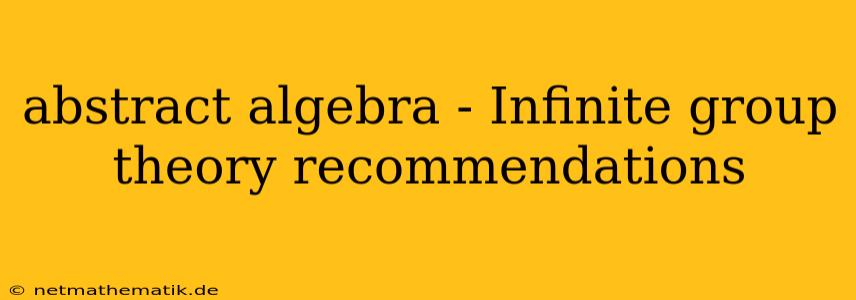The realm of abstract algebra, particularly the study of infinite groups, is a captivating and challenging area of mathematics. Exploring the intricacies of infinite group structures demands a robust understanding of foundational concepts and a thirst for delving into advanced topics. This article aims to provide a comprehensive guide to venturing into the fascinating world of infinite group theory, offering recommendations for essential texts and resources to embark on this intellectual journey.
Embarking on the Journey: Essential Foundations
Before diving into the complexities of infinite groups, a strong foundation in abstract algebra is crucial. This involves understanding the fundamental building blocks of group theory, including:
- Groups and Subgroups: The very definition of a group, its properties, and the concept of subgroups are essential starting points. Familiarity with basic group operations, such as multiplication and inverses, is paramount.
- Homomorphisms and Isomorphisms: Understanding how groups interact with each other through mappings, particularly homomorphisms and isomorphisms, is critical for studying group structures and their relationships.
- Cyclic Groups and Direct Products: Grasping the nature of cyclic groups, generated by a single element, and the construction of direct products are fundamental building blocks for understanding more complex group structures.
- Normal Subgroups and Quotient Groups: The concept of normal subgroups and their role in defining quotient groups is key to understanding how to decompose groups into smaller, more manageable components.
A Guide to Navigating Infinite Groups
Having established a solid foundation in abstract algebra, the journey into infinite group theory can truly begin.
Understanding the Infinite: Key Concepts and Tools
- Infinite Cyclic Groups: These groups, generated by a single element of infinite order, provide a starting point for understanding the infinite. Exploring their properties and relationships to other infinite groups is fundamental.
- Free Groups: The concept of free groups, where elements are essentially words formed from a set of generators, is crucial for understanding how to construct more complex infinite groups.
- Direct Products and Direct Sums: These constructions allow us to combine simpler groups into more complex ones, including infinite groups.
- Finitely Generated Groups: These groups are constructed from a finite set of generators, providing a more manageable approach to studying the infinite.
- Group Actions and Representations: Understanding how groups can act on sets and spaces, including through representations, provides powerful tools for analyzing their structures and properties.
Essential Texts for Deepening Understanding
For a comprehensive exploration of infinite group theory, the following texts are highly recommended:
- "Abstract Algebra" by David S. Dummit and Richard M. Foote: This classic text provides a solid foundation in abstract algebra, including a thorough treatment of infinite group theory.
- "A Course in Group Theory" by Derek J. S. Robinson: This book offers a more advanced treatment of group theory, delving deeper into the complexities of infinite groups.
- "Infinite Groups" by A. G. Kurosh: This comprehensive text explores the theory of infinite groups, including topics such as free groups, solvable groups, and nilpotent groups.
Exploring Beyond the Fundamentals: Advanced Topics
As your understanding deepens, you can venture into more specialized and advanced areas of infinite group theory. These include:
- Solvable Groups: This class of groups, characterized by their ability to be "built" from simpler groups, has significant applications in areas like Galois theory.
- Nilpotent Groups: This class of groups, closely related to solvable groups, has unique properties and plays an important role in various areas of algebra.
- Topological Groups: Combining the concepts of groups and topology, these groups provide a powerful framework for studying continuous actions and structures.
- Lie Groups: These groups, often seen as "smooth" versions of topological groups, are crucial in areas like geometry, physics, and representation theory.
Conclusion: A Journey of Discovery
The world of infinite group theory is a vast and rewarding landscape for mathematical exploration. Through a rigorous understanding of fundamental concepts, advanced texts, and a willingness to delve into specialized topics, you can unlock the secrets of these fascinating structures. The journey may be challenging, but the intellectual rewards are immeasurable.
